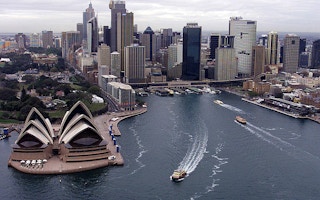As we ponder who will lead our next government we need to ask who will best deal with Australia’s overblown ecological footprint. It’s about seven global hectares per person, which is about the size of seven soccer fields and is among the largest per capita footprints in the world. It is an issue that demands attention at the highest level.
So far in the election campaign, we have seen some discussion about reducing our carbon footprint, but none about how our economic system is putting more pressure on the planet than it can bear.
The ecological footprint measures the demand humans make on nature. It estimates how much biologically active land and water a human population uses to support its way of life. This system of accounting also measures bio-capacity, which is how much biologically productive area nature has available to provide these essential and nonessential services.
The available bio-capacity of the planet is declining alarmingly as human numbers and their individual demands on environments continue to increase.
Footprint analysis takes account of the sustainability of our food production and purchases, our manufacturing, buildings, transport systems and our energy systems.
By measuring and monitoring the ecological footprint of an individual, household, community, city, business, nation or all of humanity, we can continuously monitor our pressure on the planet and make progress in reducing it. We can and must learn urgently to live within the resource constraints of a single Earth.
Footprint methodology is well-validated science and it is being used nationally and internationally by governments and civil institutions to monitor comprehensively human impact on the environment.
It estimates footprints in global hectares per person. These are about the size of a soccer field. The 15 per cent who live in rich countries use about 6.5 global hectares per person.
The 48 per cent who live in middle income countries use 1.98 hectares per person and the 37 per cent living in poor countries have an average footprint of 0.8 ha per person.
For a population of 7 billion people to live sustainably, we can use about 1.8 ha per person. We are using about 50 per cent more that that and the planet is in ecological deficit.
We are surviving this overshoot by depleting the earth’s resources, raising the earth’s temperature and reducing further the stock of biologically active land and water at the very time that human demands for them are increasing. Our environmental overshoot will go on increasing unless we very quickly transform the human mindset and the global economy, contain the growth in human numbers and develop more equitable systems for sharing across national borders.
The really good news is that about half of the human ecological footprint is attributable to carbon dioxide emissions. We know how to reduce these and by weaning our species off energy derived from burning fossil fuels, humanity’s footprint could be very significantly and rapidly reduced towards Earth’s bio capacity.
How is all of this relevant to the coming election? We need to see evidence that our aspiring leaders understand this desperately serious issue, and its implications for Australians and other world citizens. Business as usual is no longer a responsible option. If we continue to expand our footprint, it further constricts the ability of poor countries to expand theirs and hastens the decline in existing biologically active land and water. Our next prime minister must be ecologically footprint literate.
We must engage our would-be political leaders in an urgent national discussion about the disgraceful inadequacy of our current carbon emission targets.
To avoid doing what we could so easily do in drastically cutting our carbon emissions is a culpable crime, not only against our own citizens of the future, but against the capacity of people in developing countries to achieve even basic standards of health and wellbeing.
And we need a national debate about the way our economic system affects our growing footprint. We need fundamental discussions about what we want from an economic system and how we should measure progress in achieving it.
Which brings us to the issue of human health and wellbeing. Increasing numbers of thoughtful Australians are recognising the impossibility of continuing with business as usual and are seeking leadership that will place population health and wellbeing at the heart of the national enterprise, which it is manifestly not at present.
The future survival of our species depends on us reaching an acceptable relationship with the finite resources of the planet. The mental health of our young requires that they can envision a viable future for themselves and their children. They need to know we are doing the things that as a nation make hope possible.
We must engage Tony Abbott and Kevin Rudd in active consideration of these realities.
Emeritus Professor Bob Douglas is a visiting fellow at Australian National University and a former director of its National Centre for Epidemiology and Population Health. This post originally appeared here.










